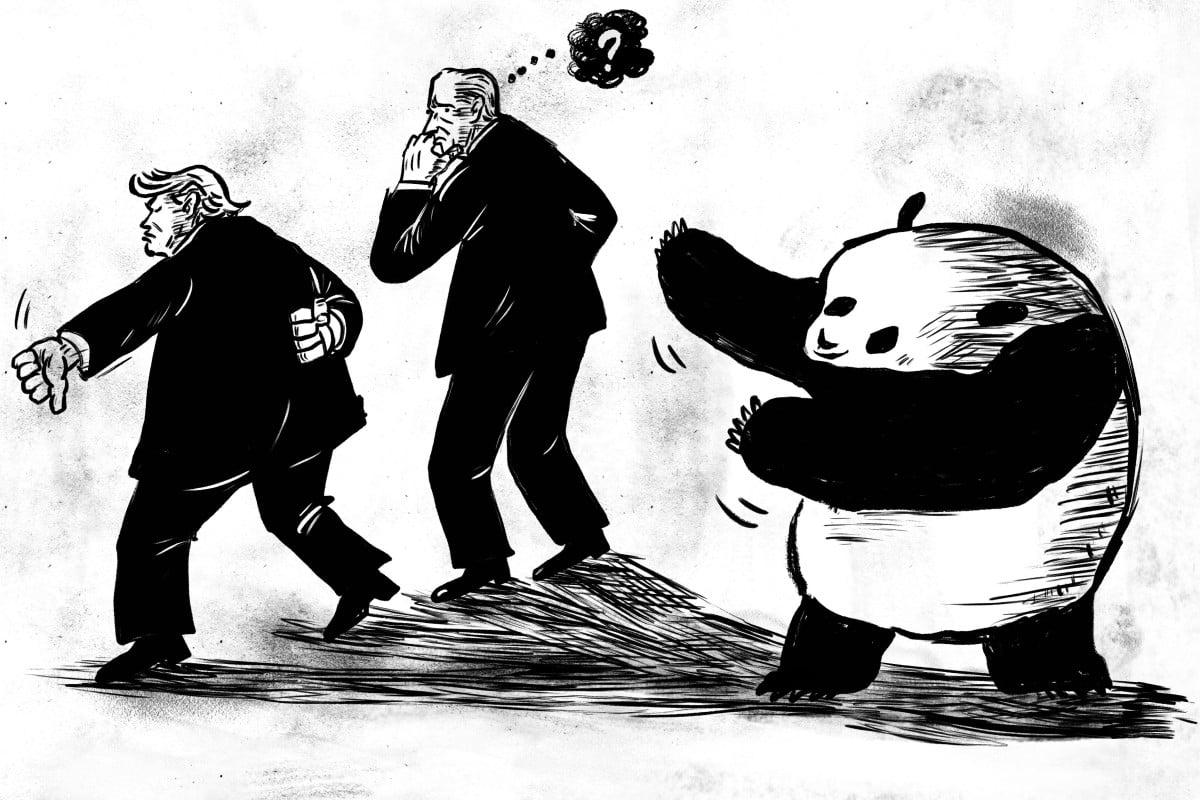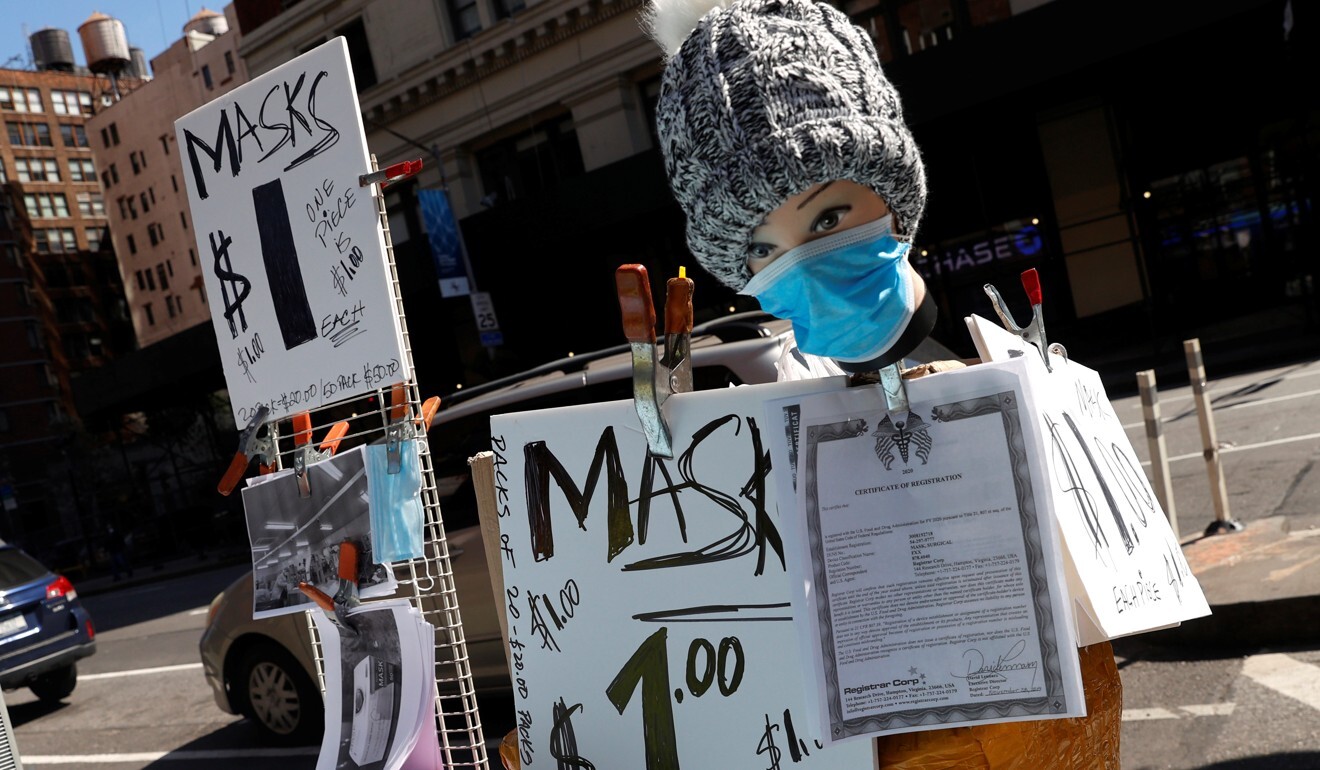
Analysts say a reset in relations would not be easy, but target public health as a potential area of mutual benefit
The Democratic presidential candidate is seen as less distrustful of Beijing and a coordinated pandemic response could be an icebreaker

Illustration: Brian WangAs voters in the United States prepare for the presidential election on November 3, the South China Morning Post is exploring the potential ramifications for China. The 13th part in the series looks at whether Covid-19 could provide common ground for Beijing and Washington if Joe Biden wins the White House. Read the entire series here.When the coronavirus pandemic hit New York, there was a sense of goodwill among many people in China, fresh from their own experiences of the hardships of lockdown and other measures to bring the outbreak under control.
Amy Wu, a 32-year-old start-up owner in Beijing, was well aware in mid-March that shortages of masks were likely to be a problem for her friends in the American epicentre of the disease, where infections were rising quickly into the thousands.
“I was worried masks would be out of stock in the United States, as was the case when China was at the chaotic initial stage of its outbreak,” said Wu, who had spent two years in New York studying for her master’s degree.

She went online and ordered 200 masks for two families she knew in the city, who received them gratefully three weeks later. The purchase and overseas delivery via e-commerce platforms had been easy and Wu was planning to buy more for her American friends.
But by April, she was surprised to find that more than half the brands for sale online – including the one she herself used – were no longer available for overseas sales.The international spotlight had fallen on masks made in China, with questions over their quality, and the Chinese government was facing accusations that it was using donations of medical gear to curry favour with recipient countries.
On March 28, the US Food and Drug Administration listed masks from six countries as “appropriate to protect public health or safety”, but left out China-made masks because of “challenges in determining the authenticity” of the imports.
“It’s a pity the international supply of masks was hampered,” Wu said. “As a result, I decided not to pick from the limited remaining choices. It was so frustrating that when the pandemic calls for goodwill and friendship, governments did not work to facilitate cooperation.”
Relations between Washington and Beijing had already spiralled to their lowest point in decades, blighted by mutual distrust in arenas from trade to technology, and there has been little evidence that the two governments are willing to work together, even when facing the common threat of Covid-19.
The approaching US presidential election has raised the question of whether a victory on November 3 for Joe Biden, the Democratic nominee, would improve relations which have deteriorated so sharply under incumbent Donald Trump, with public health a potential area for mutual benefit.
Huang Yanzhong, a senior fellow for global health at the Council on Foreign Relations, a New York think tank, said things could hardly get worse, with state-level communication on public health at a standstill since 2017.
“There are collaborations among doctors, scientists, businesspeople and NGOs from China and the US to combat Covid-19, but no government-level cooperation at this crucial moment,” he said.
The last state-level public health exchange occurred in the first year of Trump’s presidency, with a visit to Washington by Chinese Vice-Premier Liu Yandong. Deeper cooperation on health issues was discussed, but did not materialise.
Instead, since the virus surfaced in Wuhan, central China in December, a blame game has unfolded and devastated the already worsening relations. The Trump administration has slammed the Chinese Communist Party for early missteps and cover-ups, while China has accused the US of mismanagement and failure to take the pandemic seriously.
With the race to develop Covid-19 vaccines, the lack of cooperation and trust between Beijing and Washington could have devastating implications for the rest of the world as countries scramble to secure their supply.
As China and the US – along with other front runners Russia and Britain – have accelerated the vaccine development process in the hope of fast-tracking large-scale production, the first signs of a potential divide over the issue are showing.
In Asia alone, Indonesia and the Philippines have asked China to provide them with vaccines, while Singapore and Japan are partnering with US firms.
The Chinese government has said its vaccines will be a global public good and that it will give priority to the Mekong River countries: Cambodia, Laos, Myanmar, Thailand and Vietnam. It has also vowed that African countries will be among the first to benefit, fuelling accusations that China intends to extend its global influence through the supply of vaccines.
In July, top US infectious diseases official Anthony Fauci said it was unlikely the US would use vaccines developed by China or Russia, given their regulatory systems were far more opaque than those in the West.
“It’s already unrealistic to expect the US and Chinese governments to cooperate in vaccine development,” Huang said. “However, there are hopes that they can coordinate policies and minimise the cost of trade and travel restrictions. These are things a Biden administration could and possibly would do.”
Biden mentioned China only once in his acceptance speech at the Democratic National Convention last month, vowing to end US reliance on China and other countries for medical equipment, if he became president.
Masks and other protective gear are oft-cited examples by American politicians from both camps of the need for the US to reduce its reliance on made-in-China products, particularly for security-essential goods.
The issue has been used by both Trump and Biden to argue that the global supply chain needs to be restructured to reduce reliance on China, and also to accuse Beijing of using its manufacturing dominance to expand influence.
“Whoever comes to power, the Covid-19 crisis hardens US determination to reshape the global supply chain, though it may provide room for cooperation,” Huang said.
Biden, 78, is believed by experts to view China as a more benign than malign actor on the international stage – perhaps due in part to his ringside seat as vice-president under Barack Obama.
“Some criticism of China, and security and protectionism-based restriction of the medical supply chain from China in the name of resilience, will be inevitable in a Biden administration, but there is much on global health policy cooperation that is likely to appeal to Beijing,” said Sourabh Gupta, a senior fellow at the Institute for China-America Studies in Washington.
“I see the virus response as providing an important icebreaker that will enable the two countries to reset their relationship and, initially at least, work off the same page.”
Biden is no stranger to pandemics. He helped guide the Obama administration’s response to the 2009 H1N1 pandemic, which acknowledged that viruses did not respect borders and that cooperation between American and Chinese disease control authorities was beneficial.
The Democratic Party remains internationalist in outlook and Biden is expected to restore the funding to the World Health Organization that Trump has cut, Gupta said.
Chinese and American interests are aligned in areas ranging from climate change to debt reduction for pandemic-ravaged developing countries, according to George Magnus, research associate at Oxford University’s China Centre.
“Consequently, I’d hope that if a Biden administration were willing to swap tantrum diplomacy for a new, structured diplomacy, these areas would be topics for dialogue,” he said.
Biden’s experience in international relations, the likely quality of the people in his China team and a more inclusive approach towards US allies should allow for a more settled relationship, according to Magnus.
“I imagine some tariffs could be negotiable for concessions, and that Biden would better differentiate campaigns against espionage from targeting of students, and intellectual property protection from restrictions on generic goods, and favour engagement with international bodies over hissy fits against everyone.”
However, Magnus said he did not expect the overall thrust of China policy under Biden to change significantly. “China will still be a strategic competitor, ideological adversary and security threat.”
Sun Yun, a senior fellow at the Stimson Centre in Washington, said that if China viewed the Biden administration’s internationalist tendencies as “exploitable” and insisted on greater US concessions in return for its cooperation, it could exacerbate the strained relationship.
Steve Tsang, director of the China Institute at SOAS University of London, warned that China needed to change its Wolf Warrior approach – the title of a Chinese action movie series which has become a shorthand for the aggressive stance of some Chinese diplomats in defending their country’s interests.
Changes in Washington’s approach under a Biden presidency could not reset US-China relations unless China, too, made a U-turn in its foreign policy, he said.
Pang Zhongying, an international affairs analyst at the Ocean University of China, said a Biden administration – widely expected to be more pragmatic and predictable – would be likely to offer a window of opportunity for China to ease tensions.
“For relations to reset, China should adjust itself to be more market-oriented, liberal-minded and ruled and governed by law,” Pang said.
However, Wang Yiwei, an international relations professor at Renmin University, said China’s road ahead would be even more difficult because Biden was expected to form stronger alliances with other countries against China.
“The crux of Sino-US tensions is that the US cannot accept the rise of China,” he said. “China is expected to overtake the US in GDP to become the world’s largest economy as soon as 2025, so tensions are inevitable. Under that premise, any improvement brought by a change of US administration would be superficial and cooperation would be limited.”
Source south china morning post


Comment